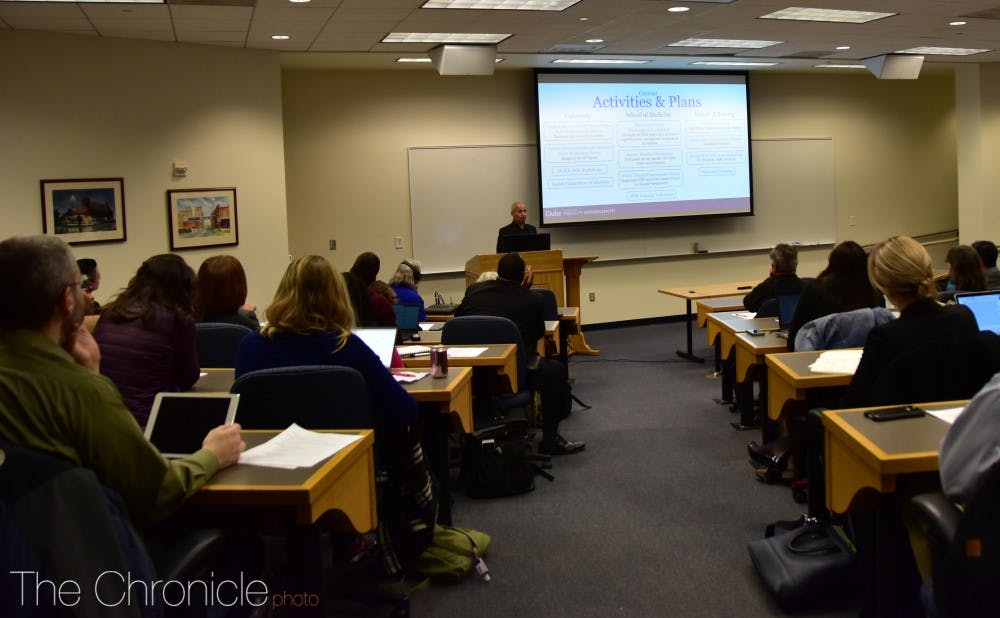Ph.D. candidates at Duke struggle to make ends meet, said students from the Duke Graduate Student Union at Academic Council's Thursday meeting.
Casey Williams, Ph.D. student in literature, presented DGSU's proposal to raise Ph.D. student base stipend to $31,800 per year, eliminate continuation fees—which amount to $3,700 per semester and are paid by graduate students beginning in their sixth year—and allocate $1,000 for each incoming student's relocation expenses.
According to the Graduate School's website, the current nine-month stipend—which covers the academic year but not the summer—for graduate students is $23,370 and the 12-month stipend is $31,160. According to DGSU, the 12-month stipend will be $31,800 beginning next year. Based on DGSU's proposal, all Ph.D. students would receive the 12-month-scale stipend.
"Cost of living in Durham has increased significantly in the last few years," Williams said. "A livable stipend does three things—it ensures that all Ph.D. students are able to make ends make while they're here, it produces higher quality research on faster timetables and it promotes diversity."
According to the Graduate School's website, the stipends have increased 23 percent since the 2008-2009 academic year.
Travis Dauwalter, Ph.D. student in public policy and president of the Graduate and Professional Student Council, spoke about his work with GPSC to establish a food pantry for Duke Ph.D. students. He said the pantry, in addition to keeping a stocked shelf, initially gave 10 food bags per week to students who applied online but had to increase to 40 bags to meet excess demand.
The need for funding varies across departments, Professor of Physics Steffen Bass said.
"I'm in the natural sciences where pretty much every faculty is almost like a small business owner," Bass said. "We have to consistently apply for grants, but we pay all of our grad students for 12 months per year."
Bass acknowledged that humanities graduate students are compensated in a different way.
"It may be educational for this body—in order for us to say something, form an opinion—to actually learn about that because I have no clue how the grad student funding works in the humanities," Bass said.
Claire Ravenscroft, Ph.D. candidate in English, said Duke's history of investing in programs that hold high priority suggests that money can be spent as long as the institution is committed to bettering graduate student outcomes.
"We know that money doesn't grow on trees and it doesn't come from nowhere," she said. "The way Duke has invested in undergraduate financial aid over the past ten years in ways that I'm sure, ten years ago, seemed quite unthinkable."
If Duke values a diverse graduate student population as much as it does a diverse undergraduate student population, money can be found somewhere, she added.
Mark Anthony Neal, James B. Duke professor of African and African American studies, said that insufficient graduate student stipends prevent institutions from recruiting a diverse student body.
"When you talk about questions of diversity, I mean just look at the diversity of the classes of graduate students coming in," Neal said. "We lose, I know, Duke has lost graduate students in [literature], in English and other social science departments, simply because they got more attractive deals from other institutions."
He added that it's challenging for graduate students to continue with their studies without support from the family.
"If I didn't have a wife who was working a full time professional job, I would not have been able to complete graduate school," Neal said.
Ravenscroft said the matriculation of her own department exemplified Neal's point on diversity in the graduate student body.
"This past year in English, we admitted nine students," she said. "Four of them decided to come to Duke, which is about half of the size of the cohort we are used to in our department—the students who decided not to come here were students of color from working class backgrounds."
Get The Chronicle straight to your inbox
Sign up for our weekly newsletter. Cancel at any time.

